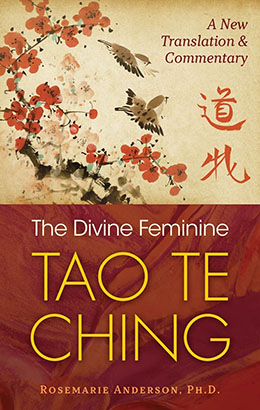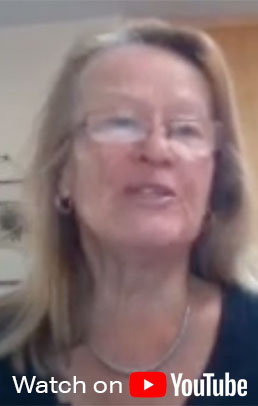Author Rosemarie Anderson reveals the feminine nature of the Tao as depicted in the Tao Te Ching as “mother,” “virgin,” and the “womb of creation.” She then discloses how Tao’s message of wei wu wei—“act without acting” and “do without doing”—offers a path of peace and well-being for ourselves and for our relations with the earth and one another, a path that arises from spontaneous action that seeks no gain for the self. This new translation, commentaries, and illustrations of Chinese calligraphy shed new light on the esoteric wisdom contained within the Tao Te Ching and on the mystical feminine essence of the Tao.
Rosemarie Anderson, Ph.D., is professor emerita of psychology at Sofia University, an author, and an Episcopal priest. In 2017 she received the Abraham Maslow Heritage Award from the Society of Humanistic Psychology of the American Psychological Association. She is the author of several books, including Celtic Oracles and Transforming Self and Others through Research. She lives in rural Oregon surrounded by wilderness and wildlife.
For Purchase
Connect with Author
The first translation of the ancient classic that reveals the feminine nature of the Tao
- Restores the feminine essence of the Tao Te Ching as well as the simplicity and poetic undertones of the chapters
- Offers commentary for each of the 81 chapters and key Chinese characters to reveal their profound wisdom
- Translated from ancient silk and bamboo slip manuscripts, the oldest known copies of the Tao Te Ching
In this book, Rosemarie Anderson shares her discoveries of the Divine Feminine Tao alongside her original translation of the Tao Te Ching. Working from ancient silk and bamboo slip manuscripts, the oldest known copies of the Tao Te Ching, the author slowly translated all 81 chapters over the course of two years, allowing each section to reveal its intimate poetic and spiritual nature. To her surprise, she discovered that the Tao was unmistakably feminine, consistently referred to as “mother,” “virgin,” and the “womb” of creation.
Anderson explains how the Tao is a feminine force, the Dark Womb of Creation, the Immortal Void renewing life again and again in ordinary times and in times of crisis. She offers commentary for each of the 81 chapters to help reveal their profound wisdom. The author also restores the chapters’ simplicity and musical undertones, explaining how, in the original Chinese manuscripts, the text is poetic and rhymed because the Tao Te Ching was often recited or sung—yet most English translations are written in scholarly prose with long sentences and complex syntax. She shows how the great Tao’s message of wei wu wei—“act without acting” and “do without doing”—offers a path of peace and well-being for ourselves and for our relationships with others and the earth, a path that arises from spontaneous action that seeks no gain for the self.
Capturing the original feminine nature of this ancient text, Anderson’s translation sheds new light on the esoteric wisdom contained within the Tao Te Ching and on the mystical feminine essence of the Tao.
The Ordinariness of Peace in the Tao Te Ching
Rosemarie Anderson, PhD
In the Tao Te Ching peace is thought simple, ordinary, and the highest purpose of good government. To be at peace in the world is to privilege what is most necessary for the greater good. For example, Poem 8 details what is “good” in everyday life, as follows:
The highest good is like water
Bringing goodness to all things without struggle
In seeking low places spurned by others
The Tao resembles water
For a house
The good is the land
For the mind
The good is depth
For relationships
The good is kindness
For speech
The good is trustworthiness
In government
The good is peace
In work
The good is skill
In actions
The good is timing
Above all do not struggle
Remain without blame
Aligning with the Tao is to enact a path of wei wu wei, meaning to act without acting. In so doing, actions arise naturally and spontaneously to meet circumstances without plotting in advance or invoking personal or political gain of any sort. Indeed, over time, enacting this wei wu wei path of selfless action will impact all our relations with others, including animals and other species, our families and communities, the conduct of governments, relationships between nations and peoples, and with planet Earth herself.
Regarding war, use of weapons, and military action, the Tao Te Ching is uncompromising. War is a last resort and enemies are to be respected. Poem 69 puts the matter directly:
Military strategists have a saying
Dare not host a war
But be the guest
Dare not advance an inch
But retreat a foot
This is called
Advancing without advancing
Seizing without arms
Taking without weapons
Confronting without attacking
No misfortune is greater than not honoring antagonists
Not to honor antagonists is to lose virtue
Therefore when antagonists are well matched
The grieving one wins
Similarly, Poem 31 depicts weapons as “ugly-hearted”: Poem 31 could not be more direct:
Surely weapons augur peril
Some things are just ugly-hearted
Hence those living the Tao resist using them
At home rulers favor the vulnerable
And only in war favor strength
Weapons are not auspicious
Wise rulers use them as a last resort and privilege restraint
Best to remain peaceful and calm
Even in victory they do not delight in them
To delight in them is to enjoy killing
Those who enjoy killing
Gain nothing in this world!
Having lived for several years on US military bases in Asia and Europe, I know that caution and restraint toward military action is common and well understood among US high-ranking military officers. High-ranking military officers are alert and careful; they know in their bones that life is at stake. This was particularly true on US military bases not far from the Demilitarized Zone (DMZ) in South Korea where I lived off and on for two years. When these bases were on “high alert,” the usual tumult and noise in the officers’ clubs chilled down to a standstill. Sometimes, I thought I could hear a pin drop. High-ranking officers are ready for war but not enthusiastic—unless they are very young (and fortunately not in charge).
While wei wu wei of Poem 8 is challenging enough, Poem 79 stopped me in my tracks. The context of Poem 79 is the settlement of a hatred or injury in ancient China. Once a settlement was agreed to, the agreement was inscribed on a bamboo stick and the stick broken in two. By tradition, the one to make payment takes the left side and the one to receive payment takes the right side. But, in Lines 4 and 5, “the wise grasp the side of debtor and make no claims on others.” I have translated Poem 79 as below:
When a great hatred is reconciled
Usually hatred lingers
How can this be good?
Thus the wise grasp the side of the debtor
And make no claims on others
The virtuous manage the accounts
And those without virtue insist on payment
The Tao of Heaven is without favorites
Yet always aligns with the good
Perhaps you feel that taking the side of the debtor is an astonishing way to settle disputes. Indeed, Poem 79 contrasts markedly with modern ideas about demanding payment for debts, holding on to one’s own equity, paying off a “war debt” as the nation that lost a war, and so on. The point being made is that the wise assume they are the one indebted and, therefore, make no claims on others. Otherwise, hatred remains.
In musing on Poem 79, I kept on wondering how could I possibly do this? How could I assume I am the debtor in conflicts and disputes with others and not go broke? How could a country behave as the debtor in international conflicts and so on? But then I started thinking about the value of apologies and forgiveness. Every time I have sincerely apologized to another or they to me, mystery abounds. What was under dispute disappears from awareness and often even from memory. Yet more, the energy returned to both parties is often astonishing and humbling. Similarly, in family and communal affairs, if parents and political leaders looked more to what we mutually owe one another rather than what others owe us, family and communal values would be very different than they are.
Optimistic as enacting the wei wu wei of peace may seem, we might generate a culture of generosity. What a concept! And, similarly, if we truly valued earth, air, fire, and water for their life-giving properties and we humans as the debtors, would that not turn around the menacing ecological disasters toward which we are heading? This is precisely what native and indigenous people have done since ancient times and often still do. Perhaps now is the time to generate a culture of unshakable indebtedness because such is the truth of what is.



